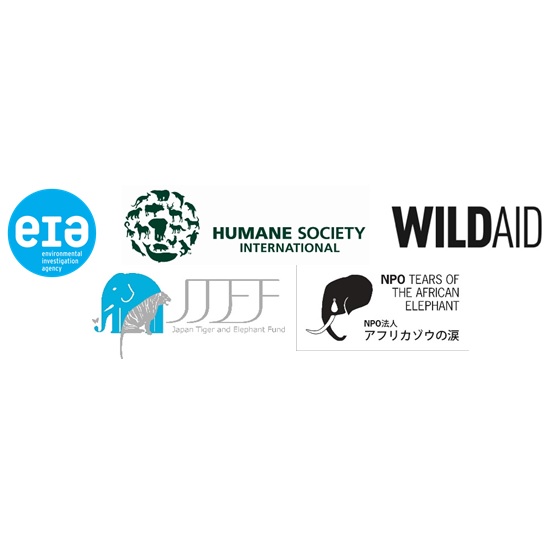
Press Release: One Year Out from 2020 Tokyo Games, NGOs Appeal to Tokyo Governor to End Ivory Trade
https://www.jtef.jp/en/wp-content/uploads/2019/07/5-org-logo.jpg 556 549 Japan Tiger Elephant Organization Japan Tiger Elephant Organization https://www.jtef.jp/en/wp-content/uploads/2019/07/5-org-logo.jpgJuly 25, 2019: TOKYO
Tokyo, Japan – One year before the start of the 2020 Tokyo Summer Games, international and Japanese conservation organizations are appealing to Tokyo Governor Yuriko Koike to ban the sale of ivory in the city. Japan boasts the world’s largest legal domestic ivory market; its ongoing support for an industry that fuels the poaching of an estimated 20,000 African elephants each year threatens to tarnish the reputation of Tokyo and the 2020 Games.
The Environmental Investigation Agency US, Humane Society International, WildAid, Japan Tiger and Elephant Fund and Tears of the African Elephant urge the Governor to support international efforts to conserve and protect Africa’s rapidly declining elephant population by closing the ivory market in Tokyo prior to the start of the 2020 Games. The city is home to a significant proportion of Japan’s 17,000 registered ivory manufacturers, wholesalers and retailers. With an estimated 10 million tourists expected to visit Tokyo for the games, there is a high risk that many will use the opportunity, either intentionally or unknowingly, to buy and illegally export ivory souvenirs from these shops.
Attention on Tokyo’s ivory trade is increasing in the lead up to the 2020 Games. In May, New York City Mayor Bill de Blasio appealed to Governor Koike to follow New York’s lead and ban the city’s ivory trade. Thirty-seven members of the U.S. House of Representatives also appealed to the Government of Japan to join others in closing ivory markets worldwide in a letter sent to Ambassador Shinsuke J. Sugiyama. On their own initiative, many private companies including Rakuten, AEON, Ito Yokado, Mercari, Inc., Amazon Japan and Google Shopping Japan have also ceased ivory sales or have announced their intention to do so before the Olympics.
Despite evidence of ongoing illegal trade that exploits loopholes in the country’s regulations, the Government of Japan has continued to support its domestic ivory trade. Japan’s position threatens to undermine bans in other jurisdictions like China, the United States and the United Kingdom. In China, officials have been ramping up their efforts and have seized an increasing number of shipments of ivory from Japan, making it clear that Japan’s domestic market is contributing to illegal international trade in ivory. There have been more than 20 seizures of ivory from Japan so far in 2019.
Japan’s ivory trade will also be under increased scrutiny at the 18th meeting of the Conference of the Parties to the Convention on International Trade in Endangered Species of Fauna and Flora (CITES), which will be held next month. The 32 African nations that comprise the African Elephant Coalition are urging Japan and the European Union to close their ivory markets.
Allan Thornton, president of EIA US, said, “We appeal to Tokyo and Japan to close the domestic ivory market to eliminate the flourishing illegal ivory trade in Japan and to support the African nations calling for bans to help protect declining elephant populations.”
Iris Ho, senior specialist for wildlife programs and policy for Humane Society International said, “There is no better opportunity than the 2020 Summer Games to showcase Japan’s commitment to environmental sustainability, a key theme of the Games. We urge the Japanese government to protect one of the planet’s keystone species by shutting down its ivory market–the largest remaining in the world.”
Masayuki Sakamoto, executive director of the Japan Tiger and Elephant Fund, said “Japan’s domestic ivory market is not only the largest legal market, but also the most open and poorly regulated one. None of the products on the market can be identified as derived from ivory legally imported before the international ban, and more are being produced daily. The legal domestic market provides a useful cover for smuggled ivory items as well as an easy place for buying ivory to be illegally exported abroad.”
Peter Knights, chief executive officer of WildAid said, “Hanko name seals, the main use for ivory in Japan, were not traditionally made of ivory and today can be made from many other materials, so there is no need to continue ivory sales.”
Airi Yamawaki, co-founder and co-director of Tears of the African Elephant said, “Based on our street survey, we can confidently say that the public is in support of joining the global community for an ivory free world and to conserve elephants for the future generations.”
- Posted In:
- Press Release




Leave a Reply